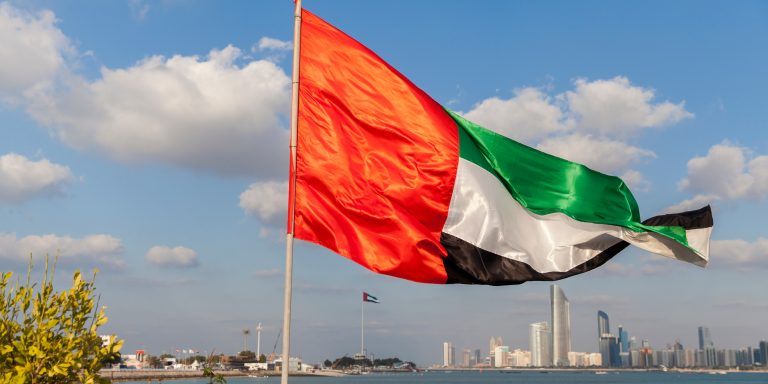INTELBRIEF
December 8, 2021
IntelBrief: Setbacks Temper UAE Regional Strategy

Bottom Line up Front
- The United Arab Emirates (UAE) has been modulating its foreign policy strategy by reducing its involvement in regional conflicts and strategically engaging adversaries.
- The adjustments to its regional policies suggest that the UAE leadership has recognized the limitations of its small military force and population.
- The apparent shift by the UAE mirrors similar moves by its close ally, the Kingdom of Saudi Arabia, with the notable exception of the conflict in Yemen.
- Outreach to Turkey and Qatar indicates that de-facto UAE leader Mohammad bin Zayid Al Nuhayyan is downplaying his ideological differences with regional states.
The United Arab Emirates (UAE), a federation of seven principalities (emirates) celebrating its 50th anniversary, experienced no unrest during the “Arab Spring” uprisings of 2011. Yet, de-facto UAE leader Sheikh Mohammed bin Zayed Al Nahyan, Crown Prince of the federal capital city-state of Abu Dhabi, has been at the forefront of a regional coalition seeking to keep in power established Arab governments. The UAE under Sheikh Mohammed’s leadership has sought to counter the influence of regional Islamist movements, particularly those linked to the Muslim Brotherhood—a policy that has brought the UAE into confrontation with NATO member Turkey, nominal Gulf ally Qatar, and in 2012, an elected Muslim Brotherhood-led government in Egypt. The federation also has, in partnership with its main Gulf ally, Saudi Arabia, as well as the United States, tried to roll back Iranian influence in the region.
To try to accomplish its policy goals, the country’s leadership has—sometimes contrary to U.S. regional stances—sent the relatively small 60,000 person Emirati armed forces directly into battle. Yet, Shaykh Mohammad’s strategy has come up against its limitations. The joint Saudi-UAE war effort, begun in March 2015, to defeat the Iran-backed Houthis in Yemen—a war that Saudi Crown Prince Mohammad bin Salman (MBS) predicted would be won in three weeks—has bogged down to the point where most experts assess it as a defeat. Seeking to cut its losses and reduce unprecedented U.S. and international criticism of the UAE for causing civilian casualties in Yemen, the UAE pulled its ground forces from the front line. UAE leaders went forward with the withdrawal even though doing so injured their relations with the UAE’s main regional ally, MBS.
In partnership with the military-led government of Egypt, which the UAE has funded generously, the UAE used its capable air force to support eastern Libya warlord Khalifa Haftar. The UAE and Egypt see Haftar as a staunch opponent of Islamist movements, particularly Muslim Brotherhood affiliates, and jihadist groups. However, Haftar’s 2019 attempt to consolidate control of all of Libya by capturing Tripoli failed, in part as a result of Turkish military support for Tripoli, and since the ceasefire, Haftar has decided to compete in presidential elections scheduled for December 24. Yet, the UAE still has sought to advance its “counter-revolutionary” objectives when doing so involves little risk; the country backed Tunisian President Kais Saied suspending parliament and seizing executive power in July. UAE leaders also apparently saw little risk in reopening the UAE embassy in Kabul in November, despite serious concerns about the Taliban’s continuing ties to al-Qaeda.
The UAE’s Iran policies offer the clearest evidence that its leadership is moderating its regional policies in recognition of its limitations. During 2021, in apparent recognition that U.S. sanctions pressure had not set back Iran strategically, the UAE, as well as Saudi Arabia, have directly engaged with Iranian officials to try to lower tensions. Saudi and Iranian officials have recently held four rounds of talks brokered by Iraqi Prime Minister Mustafa al-Kadhimi. Following the Saudi lead, Iran's top nuclear negotiator, Ali Bagheri Kani, met with senior Emirati officials on November 24 as part of Abu Dhabi’s effort to engage Iran diplomatically even on highly contentious issues. The UAE-Iran engagement escalated substantially with the December 6 visit to Tehran of UAE national security adviser, Sheikh Tahnoon bin Zayed Al Nahyan (brother of Sheikh Mohammed), to discuss expanding bilateral ties. Rather than confronting Iran in Syria, the UAE has stepped up its diplomacy there in an effort to reduce Iranian influence. On November 9, UAE Foreign Minister Abdullah bin Zayed Al Nahyan met President Bashar al-Assad in Damascus, despite U.S. criticism that the visit downplayed Assad’s human rights abuses in favor of strategic gains.
The UAE also appears to have assessed that its ideological confrontations with other regional states have yielded more costs than benefits. In 2017, the UAE and Saudi Arabia severed relations with Gulf partner Qatar on the grounds that it was pursuing some foreign policies, such as engagement with Iran and Turkey, at variance with those advanced by the Kingdom and the UAE. Unable to compel Qatar to alter its policies, in January 2021, the UAE reluctantly acquiesced to the Saudi decision to reconcile the dispute. In August and September, National Security Adviser Sheikh Tahnoon met Qatar’s Emir Sheikh Tamim bin Hamad Al Thani in Doha and in Saudi Arabia—significant steps to move beyond the rift. Similarly with regard to Turkey, in late November, Sheikh Mohammed visited Ankara. The high-profile visit signaled that the UAE wanted to mute its differences with Turkish President Recep Tayyip Erdogan—even as neither the UAE nor Turkey has ceased support for their respective allies in Libya. The UAE’s foreign policy adjustments over the past few years have, to date, succeeded in reducing U.S. and international criticism of the country. But, the potential remains for Sheikh Mohammed and his key partner, MBS, to return to a harder line if Iran further expands its regional influence or established Arab leaders once again face new uprisings or significant challenges from Islamist movements still prominent in the region.